Steve Marshall announces successful defense of Trump-era Endangered Species Act reforms
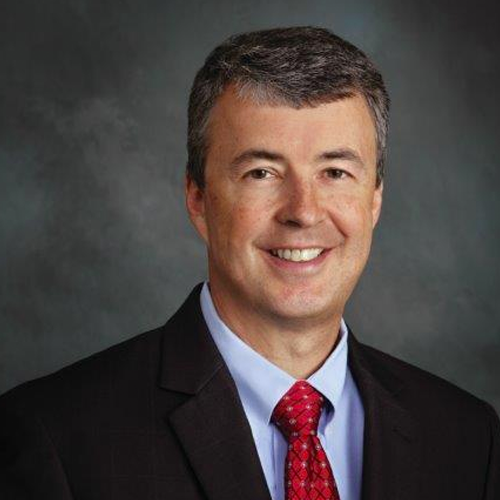
Alabama Attorney General Steve Marshall announced that on Monday, a federal court in California denied a request by environmental groups to set aside the Trump administration’s rules and revive the Obama-era environmental enforcement of the Endangered Species Act. Marshall said that the court’s decision serves to preserve the more balanced enforcement rules of the Trump administration nationwide, including in Alabama. “In 2016, Alabama led a coalition of states to challenge unlawful environmental regulations by the Obama administration that went far beyond what the text of the Endangered Species Act allowed and imposed unfair burdens on private property rights,” said AG Marshall. “That case settled in 2018 when the federal government promised to reconsider the rules. As promised, in 2019, the Trump administration enacted new regulations that made the Endangered Species Act work better to protect both wildlife and property rights. The regulations eased burdens on landowners while providing them incentives to care for the wildlife on their property—a win-win for Alabama’s landowners and the great diversity of wildlife in our State.” “Predictably, the Trump regulations were challenged in federal court in California by a set of radical environmental groups and blue states who opposed the regulations’ cooperative approach to environmental protection,” Marshall explained. “In response, Alabama once again led another coalition of states to intervene to defend the rules. That turned out to be necessary because the Biden administration abandoned defense of the rules, and the federal court vacated them, despite never having identified any legal infirmity with them. We sought relief from the U.S. Court of Appeals for the Ninth Circuit, which agreed that the district court had erred.” “Yesterday, the district court again remanded the rules to the federal agencies to consider as they work on proposing a new set of regulations,” said Marshall. “But this time, the court rejected the environmental groups’ request to vacate the challenged regulations, meaning the Trump regulations will remain in place until new regulations are finalized—a process that is expected to take two years as the agencies provide time for stakeholders, including states and landowners, to provide comments on any proposed changes. Without our intervention, the rules we fought so hard for likely would have been unlawfully vacated as the Biden administration rolled over to appease the environmental groups. And stakeholders likely would have been deprived of their right to participate in the process of shaping any changes to current rules. But because we were there, the rule of law was vindicated.” Attorney General Marshall was joined by attorneys general from Alaska, Arkansas, Idaho, Kansas, Missouri, Montana, Nebraska, North Dakota, Utah, West Virginia, and Wyoming, as well as the Arizona Game and Fish Commission, in defending the Endangered Species Act reforms. The Endangered Species Act was passed by Congress in 1973 (on the heels of a 1967 precursor law) Since the Act’s passage, 99% of the species on the list have been protected from extinction. Marshall was recently reelected to his second term as Alabama’s Attorney General. His second term begins in January. To connect with the author of this story, or to comment, email brandonmreporter@gmail.com.
AG Steve Marshall fights to protect Alabama land from Biden administration ‘overreach’
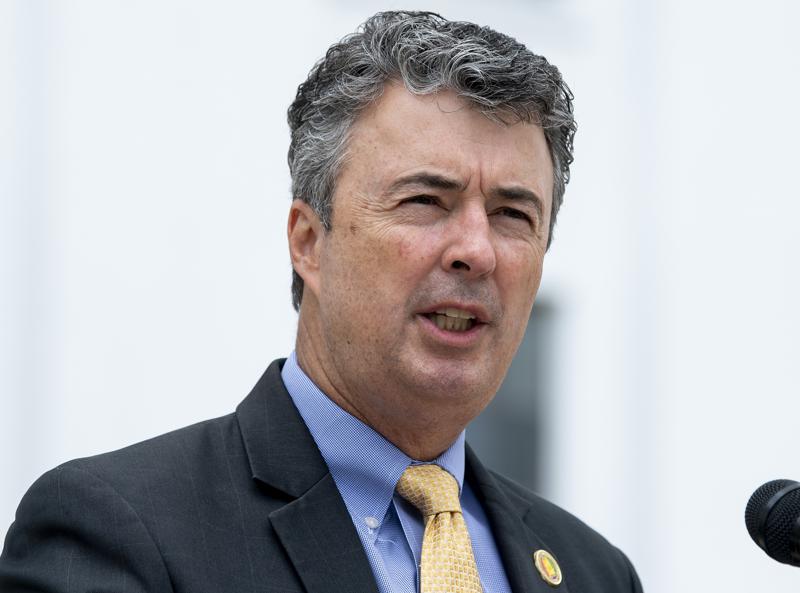
Attorney General Steve Marshall announced he is leading a national coalition of 18 attorneys general urging the Biden administration not to reverse Trump era definitions of “critical habitat” that may affect property use and value. Marshall’s letter to the U.S. Fish and Wildlife Service and the National Marine Fisheries Service was cosigned by the attorneys general of Alaska, Arizona, Arkansas, Indiana, Kansas, Kentucky, Louisiana, Mississippi, Montana, Nebraska, Ohio, Oklahoma, South Carolina, Texas, Utah, West Virginia, and Wyoming. The issue involves the Endangered Species Act and the federal government’s authority to designate land or water as a “critical habitat” for species the government considers endangered. Property that receives this designation is often subject to strict restrictions which can affect property value and use. In 2017, the Obama administration argued that an area could be a “critical habitat” for a species even if the species could not survive there. In response, Marshall led a group of states opposing that approach, and the Supreme Court held that the Obama administration had overreached. Marshall supported Trump administration reforms that protected species without crippling the rights of landowners. The Biden administration is now considering changing the Trump administration’s definition of “habitat” for use in “critical habitat” designation. In the letter, the group urged the agencies to reject the Biden administration’s efforts to roll back the reformed regulations. Under current rules, an area may be designated as critical habitat only if it currently or periodically has the conditions and resources to support a species, and not just because such conditions could be developed in the future. Furthermore, current rules provide an important balance, providing analysis of the economic impact and whether excluding an area from critical habitat would result in the extinction of a species. Marshall stated, “I will not allow the Biden administration’s misplaced priorities and overreach to destroy the vital progress we have made. If federal bureaucrats are allowed to designate land as critical habitat for species even though that species does not and cannot live there, then there is no limit to the areas they can claim. The results could be devastating for Alabama’s farms, loggers, and miners as well as for landowners throughout our nation.”
Alabama to be hit hard by Obamacare increases for 2017, report shows

Alabamans will find the Affordable Care Act a lot less affordable in 2017. The Obama administration announced official numbers this week on how much more the ACA — commonly known as “Obamacare” — will cost Americans in the coming year. Most people nationwide were shocked, and Alabama will feel the pinch more than nearly any other state. Deductibles for individuals covered by the lowest-priced Obamacare bronze health plans are set to average $6,000 in 2017 — the first time in the three years of ACA marketplaces that they cracked that threshold. As for the second-highest silver plans – the most popular choices – Birmingham will have one of the largest increases in unsubsidized premiums, up 71 percent from $288 to $492 for a 40-year-old non-smoker), according to a recent study by the Henry J. Kaiser Family Foundation. Due to their popularity, silver plans are used to determine subsidies an individual or family would receive through the ACA. Most people who get coverage through the marketplaces receive a tax credit to lower premiums. CNBC reports that most subsidized customers opt for a silver plan, because the subsidies reduce their monthly costs, and because silver plans are the only ones where out-of-pocket financial subsidies are applied. In 2016, a 40-year-old adult making $30,000 per year would pay about $208 per month for a silver plan. In some parts of the country, a person switching to a new second-lowest-cost silver plan is in 2017 will pay a similar amount; the after-tax credit payment in 2017 is estimated at $207 per month or a change of 0 percent. Average monthly payments for bronze plans nationwide are scheduled to increase a minimum of 21 percent next year for those Americans who earn too much to qualify for subsidies. A 40-year-old bronze plan customer without subsidies can expect to pay $350.23 each month for their health coverage; this year, it was about $289.88 per month. Deductibles for silver plans will also average about $3,572 for individuals next year. That’s about 15 percent more than the current average deductible for silver plans. In addition to higher premiums, Alabama will also have fewer choices in insurance providers. Kaiser found that losses in the market caused by higher premiums and deductibles are leaving some insurers — like UnitedHealth and Aetna — to pull out of either the ACA marketplace or individual markets altogether. States like Alabama and Florida, which use the federally run Healthcare.org, will have an average number of insurers participating in the ACA marketplace drop to 3.9 in 2017 (down from 5.4 companies per state in 2016, 5.9 in 2015 and 4.5 in 2014). In 2017, Alabama — as well as Alaska, Oklahoma, South Carolina, and Wyoming — will have only a single insurer offering plans in the marketplace. Kaiser’s full report on the “Obamacare” changes can be found here.
AG Luther Strange announces nationwide injunction blocking White House transgender bathrooom policy
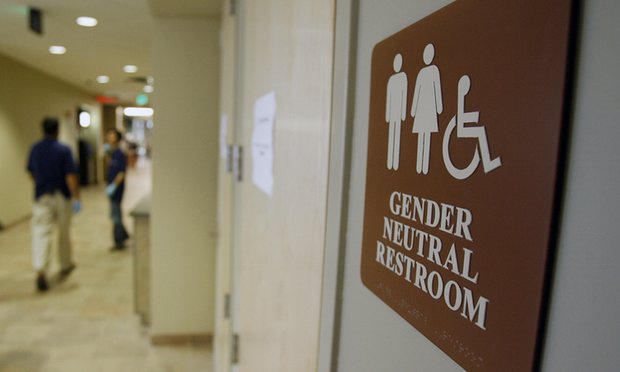
Monday morning Alabama Attorney General Luther Strange announced a U.S. judge has blocked the Obama administration guidance that transgender public school students must be allowed to use bathrooms of their gender “identity” — rather than their sex, or risk losing federal funding — granting a nationwide injunction sought by a group of 13 states, including Alabama. U.S. District Judge Reed O’Connor has granted a preliminary, nationwide injunction in response to a lawsuit filed by Texas and a number of other states. In a decision late Sunday, O’Connor explained the Obama administration failed to follow proper procedures for notice and comment in issuing the guidelines. He also said the federal guidelines had the effect of law and contradict existing legislative and regulatory texts. “The court decision is a victory for parents and children all across Alabama,” said Attorney General Strange. “I joined the multi-state lawsuit against the Obama administration in May to prevent Alabama schools from being forced to surrender their restroom access policies to social experimenters in Washington. I am pleased the federal court has agreed to our request to stay the controversial order while our lawsuit challenging the legality of the transgender order continues.” On May 13, 2016, the U.S. Department of Education and U.S. Department of Justice jointly announced schools must allow students access to restrooms and locker rooms of their gender “identity” rather than their sex, or lose federal funding. On May 27, Strange advised the Alabama Board of Education, which governs K-12 public schools, that it did not have to follow the federal edict until the multi-state lawsuit is addressed in federal court. The 13 states that filed the lawsuit requesting the stay include Alabama, Arizona, Georgia, Kentucky, Louisiana, Maine, Mississippi, Oklahoma, Tennessee, Texas, Utah, West Virginia, and Wisconsin. Status of Transgender “Bathroom Bill” Legislation | InsideGov You can read a copy of the entire stay here.
Obama administration issues new, tougher offshore drilling rules

The Obama administration has issued new rules to make offshore oil and natural gas drilling equipment safer and to reduce risks in digging wells, but the oil industry is blasting those rules as unnecessary and costly. The rules were published Thursday by the Interior Department, nearly six years after the catastrophic blowout of a BP well in the Gulf of Mexico killed 11 workers and injured many others. The out-of-control leak dumped millions of gallons of oil into the Gulf. The rules take aim at blowout preventers, massive valve-like devices meant to prevent oil and gas from escaping when a driller loses control of a well. The device failed in the BP spill. Industry leaders warn the rules could make it too costly to drill in some places. Republished with permission of the Associated Press.
Attorney General, coalition of states announce plan to ask federal court to vacate EPA rule
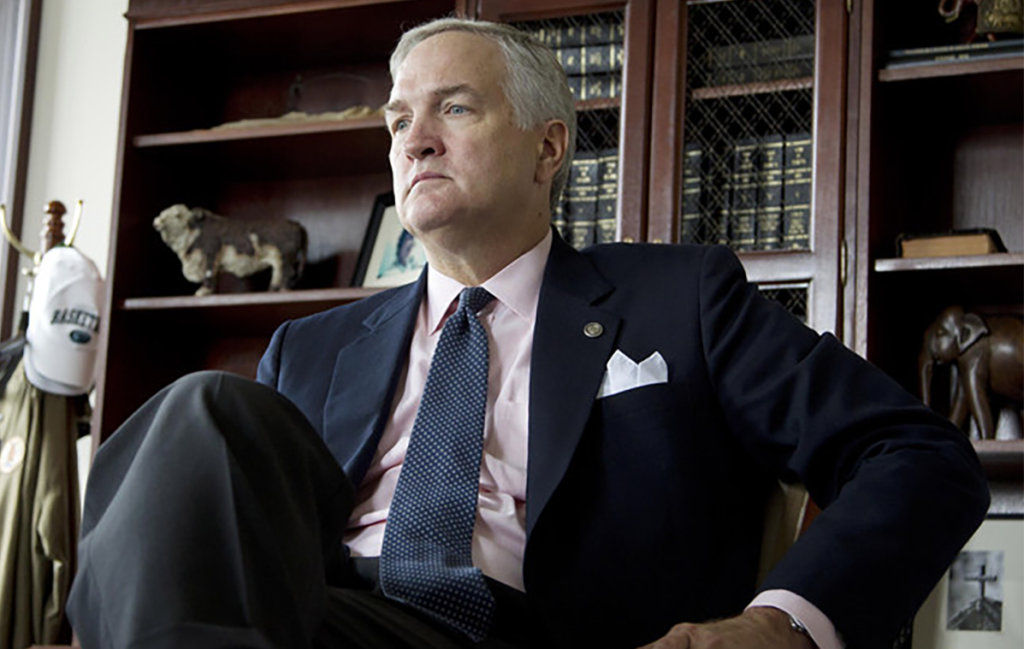
Alabama Attorney General Luther Strange announced over the weekend he would join a group of mostly Republican states to ask a federal court permanently nix Environmental Protection Agency-proposed carbon rules which recently had a setback in the U.S. Supreme Court. The EPA proposal – dubbed the Clean Power Plan – seeks to reduce carbon emissions by reining in or closing many coal-fired power plants that emit carbon pollution. Strange and a coalition of other state attorneys general filed litigation on Friday that would “go ahead and rule against the plan” now that the Supreme Court has issued a stay against it, holding up progress until further review. “Ten days after winning a stay in the United States Supreme Court of President Obama’s so-called Clean Power Plan, Alabama and a majority of U.S. states are asking the U.S. Circuit Court in Washington, D.C. to permanently vacate the Obama administration’s illegal carbon rule, once and for all,” said Strange, who has long opposed the carbon emissions plan. Strange explained his rationale for filing the claim in a statement Sunday afternoon, calling the environmental agency’s proposal a “power grab” by the federal government. “The EPA not only goes too far in seeking to impose arbitrary and overly restrictive limitations on carbon dioxide emissions, but it does so with the goal of changing America’s energy sources. The EPA’s costly carbon rule is little more than a power grab and just the latest in a long list of Obama administration attempts to end-run Congress,” Strange said. The case is now in the hands of the U.S. Court of Appeals for the District of Columbia Circuit, which will issue a ruling on the merits of the case. Oral arguments are set to begin in June after the court reviews the litigation. “Relying on an obscure provision of the Clean Air Act, EPA’s Rule seeks to effect an ‘aggressive transformation’ of the mix of electricity generation in nearly every State by systematically ‘decarbonizing’ power generation and ushering in a new ‘clean energy’ economy,” the case filed Friday reads. “Although Congress has debated a number of bills designed to achieve that very result, it has not yet adopted any such legislation. Frustrated with Congress, EPA now purports to have discovered sweeping authority in Clean Air Act section 111(d)—a provision that has been used only five times in 45 years—to issue a ‘Power Plan’ that forces States to fundamentally reorganize electricity generation throughout the country.” Strange is not alone among Alabama leaders in opposing the plan. U.S. Reps. Martha Roby and Gary Palmer have derided the plan as a job killer that could cause “enormous harm” to the American economy.
Martha Roby, Richard Shelby: Housing immigrant detainees at Maxwell-Gunter AFB ill-advised
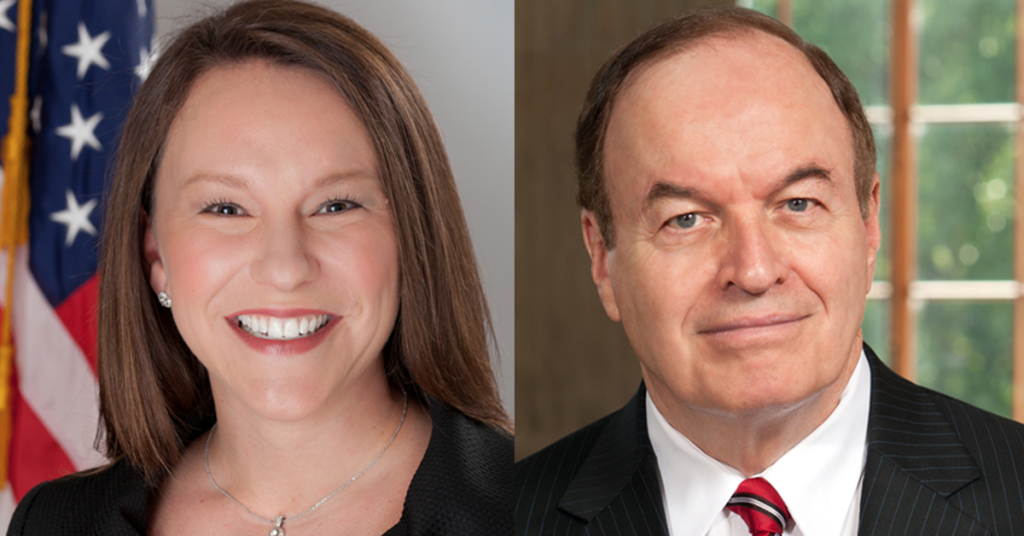
Republican U.S. Rep. Martha Roby had harsh words for an Obama administration plan to evaluate the feasibility of housing undocumented immigrant minors at Maxwell-Gunter Air Force Bace in Montgomery as they await deportation. Roby on Wednesday called the plan, proposed by the federal Department of Health and Human Services, a “terrible idea,” and vowed to oppose it. “The Air Force personnel at Maxwell-Gunter, like members of the U.S. Military stationed at bases throughout the country, are working hard to keep America safe. That mission is challenging enough without the added responsibility of housing, feeding and securing detainees,” Roby wrote. Roby pointed to her past advocacy on the issue, saying she helped “shut down” a past attempt to house immigrants detained at the Mexican border along with the Alabama delegation, and that they are “working every angle to shut it down again.” U.S. Sen. Richard Shelby also registered his displeasure with the proposal in an announcement. “This Administration has once again ignored what is in the best interest of the American people. The decision to assess the possibility of housing illegal immigrants at Department of Defense facilities, like Maxwell-Gunter Air Force Base, will only exacerbate our illegal immigration problem by not enforcing the laws on the books,” said Shelby, Alabama’s senior senator. “President Obama’s disregard for the rule of law and his attempt to push executive amnesty has led us to where we are today,” Shelby inveighed. “I remain steadfast in my opposition to illegal immigration, and I will fight against allowing those who break our laws to be housed at Maxwell-Gunter Air Force Base.”
White House: All GOP candidates should disavow Donald Trump
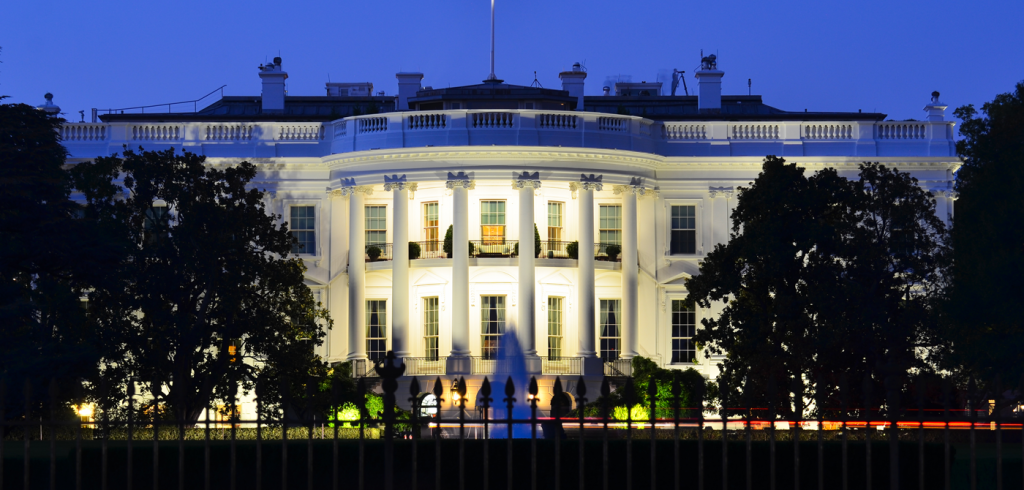
The White House says any Republican presidential candidate too scared of the GOP political base to condemn Donald Trump shouldn’t be president. White House spokesman Josh Earnest says Trump’s plan to bar Muslims from entering the U.S. is disqualifying. He says every Republican presidential candidate should say that they wouldn’t support Trump if he is the GOP nominee. Earnest described Trump’s campaign as a “carnival-barker routine.” The White House is deeming Trump’s rhetoric on Muslims as harmful to the United States and its national security. Earnest says it’s “offensive and toxic” and clearly shows Trump lacks the judgment to be president. Trump’s proposal has been condemned by many Republican candidates but cheered by many Trump supporters. Republished with permission of The Associated Press.
Robert Bentley says Obama administration unresponsive, out of line on refugee plans
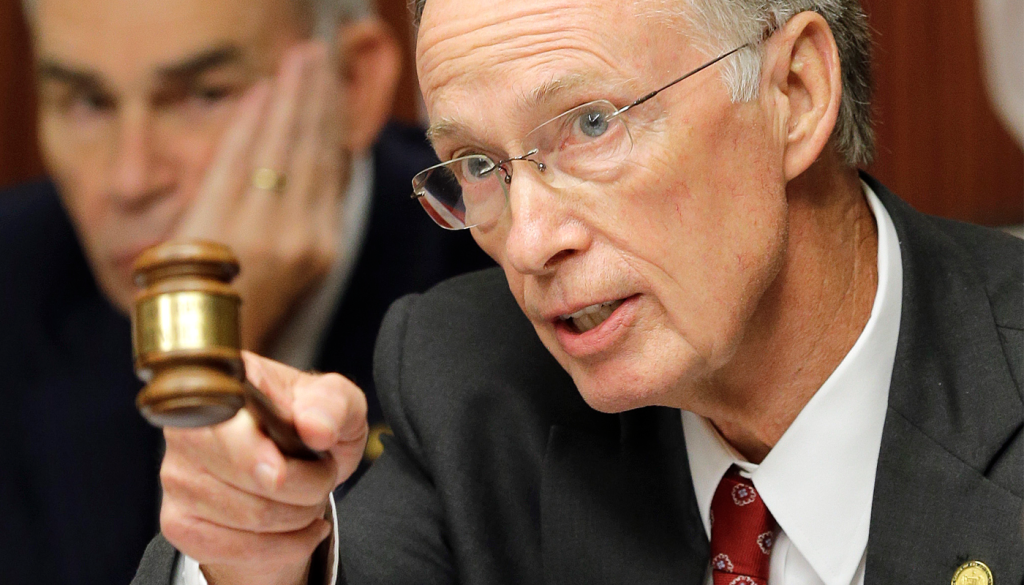
In another missive by Gov. Robert Bentley aimed at federal officials in Washington, the governor accused the Obama administration of efforts to “circumvent” states on ongoing plans to relocate thousands of refugees from war-torn Syria on Wednesday. “I continue to have great concerns with the refugee vetting process, particularly the lack of state involvement, oversight or knowledge,” Bentley said in a statement. “I cannot help but believe the intent appears to be an effort to circumvent states and our ability to adequately protect our people and ensure the safety of our citizens.” Bentley joined several other primarily Republican governors in declaring their intent to refuse any incoming refugees should the federal government plan to relocate them within their borders. Bentley said last month he “would not stand complicit” with any scheme to move migrants into Alabama, which he said “places the citizens of Alabama in harm’s way.” In a letter addressed to White House Chief of Staff Denis McDonough, Bentley excoriated the office for refusing to reply to earlier notes and for creating a “filter” through which governors had to go in order to speak with the administration. “As governor, I take very seriously my responsibility to ensure the safety and security of Alabamians,” wrote Bentley. “The Refugee vetting process, in my opinion, in structured in such a way that excludes states from any oversight and severely limits the amount of information the states may have regarding refugees.” The Obama administration has called their vetting process “the most robust screening process for any category of individuals seeking admission into the United States,” wherein candidates are subjected to the very highest levels of scrutiny. “I must point out the missing element of state government involvement in that process,” Bentley intoned. The federal government has said previously that governors are entitled to quarterly reports, but has indicated they will not process answers to individual inquiries from governors in most cases. McDonough has offered to allow the National Governors’ Association as a go-between with the White House, but Bentley rejected that as a non-starter. “I cannot accept that proposal as a workable solution,” Bentley wrote. “There should be no filter between the federal government and state governments, and especially between the President and Governors regarding an issue of such high importance as national security. “As I expressed in my letter last week, Alabama has not received any refugee reports regarding any refugee of any national origin. I do not believe placing a filter such as NGA between the Administration and the Governor’s Office addresses this current problem, nor does it solve future concerns regarding the vetting process,” said Bentley.
U.S. Department of Education approves state tweaks to No Child Left Behind

The federal Department of Education on Thursday approved petitions by seven states – including Alabama – for increased state-level flexibility in implementing the Elementary and Secondary Education Act, better known as the “No Child Left Behind” law approved by Congress in 2001 under then-President George W. Bush. The department said their decision reflected both the success of the federal law overall – which in part has been aided by innovations from states and local districts – as well as a growing desire for autonomy in many states. “The last six years have seen dramatic progress for America’s school children. The high school dropout rate is down, and graduation rates are higher than they have ever been,” said U.S. Secretary of Education Arne Duncan in a news release. “As a result of our partnerships with state and district leaders to couple flexibility with reform, we are seeing remarkable strides and bold actions to improve student outcomes. States, districts, principals and teachers are showing incredible creativity in using different means to achieve the same goal — getting every student in America college- and career-ready,” added Duncan, a former CEO of Chicago Public Schools district. Alabama’s specific increases in flexibility were as follows: Alabama created a Principal Leadership Network to ensure that principals in its lowest-performing, or priority, schools have the support to be effective leaders in these schools, as measured by the state’s principal evaluation and support system. Through this program, regional cohorts of principals gather regularly to discuss strategies for school improvement, participate in professional development, and visit to model classrooms and schools throughout the state. The state has identified exemplar schools and classrooms that have shown progress in closing achievement gaps for students with disabilities. School leaders and teachers from across the State can visit these classrooms to observe strong practices. The education department used the occasion – which critics may cite as a setback for the federal government, which devolves some power back to the states – to boast about the improvements the Obama administration has brought to the now 15-year-old legislation. Since this flexibility was first granted in 2012, read the announcement, the Department has partnered with state and district leaders to provide relief from some provisions of NCLB in exchange for taking bold actions to improve student outcomes and ensure equity for all students. Under NCLB, schools were given “many ways to fail but very few opportunities to succeed,” foisting one-size-fits-all solutions upon a vast menagerie of states with very different student populations. Today’s announcement added three years of increased flexibility to Alabama’s addendums to the law. The other states that successfully petitioned for more legal wiggle room were Arizona, Arkansas, Connecticut, Mississippi, New Hampshire and Wisconsin.
Jeff Sessions continues to press conservative agenda on immigration
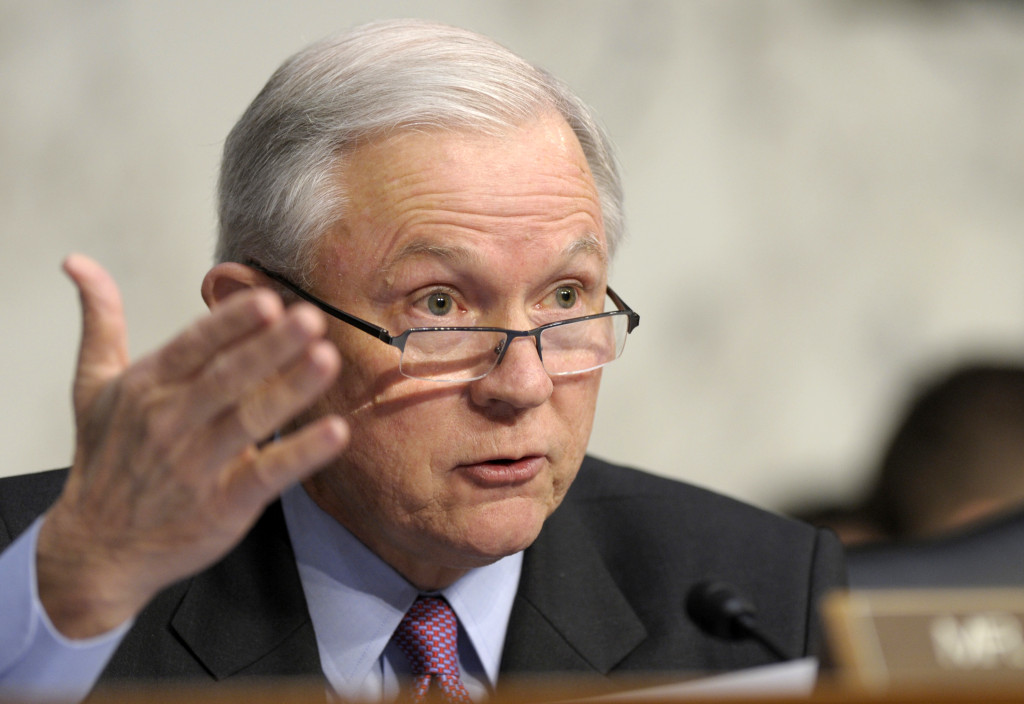
In a letter taking to task Obama administration officials over the release from state custody of more than 100 deportable immigrants who later went on to commit violent crimes, U.S. Sen. Jeff Sessions continued to work with Republican allies to advance a conservative immigration policy in the Senate. Sessions and U.S. Sen. Chuck Grassley — chairman of the Senate Judiciary Committee where Session has taken an active role lately — sent a letter addressed to Secretary of State John Kerry, Homeland Security Secretary Jeh Johnson, and Attorney General Loretta Lynch. Their letter railed against poor execution of deportation protocols by the federal Immigration and Customs Enforcement, formally requesting detailed answers to a list of more than 25 specific inquiries about why 121 suspected killers were allowed to pass through the federal immigration enforcement system and remain in the country. According to information provided by ICE, up to 121 homicides in the U.S. could have been avoided between Fiscal Year 2010 and 2014 had the aliens with criminal convictions been deported instead of released, Grassley and Sessions wrote. “This disturbing fact follows ICE’s admission that, of the 36,007 criminal aliens it released from ICE custody in FY 2013, 1,000 have been re-convicted of additional crimes in the short time since their release.” The senators pointedly asked the Cabinet members, appointed by President Barack Obama, whether their agencies are “fully leveraging existing tools and resources to prevent these dangerous outcomes.” “In the ongoing talks between the U.S. and Cuba, does the administration plan to make repatriation of all of those 30,000+ Cuban nationals, and not just some subset of that group, a condition precedent of granting diplomatic recognition to Cuba?” reads one question. “If not, why not?” The letter is in keeping with a long-term push on immigration on the part of Alabama’s junior senator. Last week, Sessions was vindicated in the conservative press after U.S. Rep. Paul Ryan expressed skepticism about Sessions’ claims that the Trans Pacific Partnership contains loopholes that could lead to a “flood” of new immigration. Ryan had called the language within the proposed TPP that would relax restrictions on the “Movement of Persons,” including professionals operating independently, an “urban legend.” Recent revelations about the trade deal, however, indicate that provisions to forbid mandatory interviews and economic means testing for visa-seekers are indeed part of the proposal, something that Sessions — dubbed by POLITICO as “the Senate’s anti-immigration warrior” — had spoken against. Senate Republican Whip John Cornyn of Texas called Sessions “perhaps the most vocal member of our conference” on immigration after he led the charge in confronting his own caucus in opposition of new H-1B visas for skilled foreign workers, saying it negatively affects domestic job-seekers. “We’ve got to ask — which hasn’t been asked — what does all this do to the ability of a college graduate who’s living at home with his parents because he can’t find a job?” said Sessions, chairman of the Subcommittee on Immigration & the National Interest. That’s a familiar note in his protectionist quest against labor pool distortions because of foreign labor. His approach to the issue evidently has struck a chord in his home state: Sessions was the only incumbent senator who ran unopposed in both primary and general elections in 2014. Sessions and Grassley gave the administration officials addressed in their inquiry a July 6 deadline to respond.
High court same-sex marriage arguments to start Tuesday

Five lawyers will take turns at the U.S. Supreme Court lectern Tuesday for the highly anticipated and extended arguments over same-sex marriage. Among them are the Obama administration‘s top lawyer at the high court, with more than two dozen arguments behind him, and two lawyers making their first appearance before the justices. The cases come from Kentucky, Michigan, Ohio and Tennessee, all of which had their marriage bans upheld by the federal appeals court in Cincinnati. The justices will hear 2½ hours of arguments on these two questions: whether same-sex couples have a constitutional right to marry, and whether states must recognize same-sex marriages from elsewhere. Civil rights lawyer Mary Bonauto, backed by Solicitor General Donald Verrilli Jr., will argue for the right to marry. Former Michigan Solicitor General John Bursch will defend the state laws. On the second question, Washington lawyer Douglas Hallward-Driemeier will urge the court to rule that states must recognize same-sex marriages performed elsewhere. On the other side will be Joseph Whalen, Tennessee’s associate solicitor general. A look at the advocates: Bonauto has been called the Thurgood Marshall of the push for equal rights for gay and lesbian in the United States. She was the winning lawyer the first time a court granted same-sex couples the right to marry, in Massachusetts in 2003. She hopes her next argument is the last time same-sex marriage is tested in court. The 53-year-old has been at the forefront of the legal fight for gay rights, including same-sex marriage, for more than two decades. But it will be her first argument before the nation’s highest court. In her early days as the civil rights project director at the Boston-based Gay & Lesbian Advocates & Defenders, where she has worked for 25 years, Bonauto said she used to say no when same-sex couples asked her to take on their marriage cases in the courts. As recently as late 2012, Bonauto worried that the time was not yet right to ask the Supreme Court to settle the issue once and for all. But that time has now arrived, she said. “There’s no reason to tell these families they should be denied legal respect. It’s our hope that we soon will be able to secure that for people everywhere,” Bonauto said in a recent call with reporters. Bonauto received a MacArthur Foundation fellowship last year. She lives in Portland, Maine, with her wife, professor Jennifer Wriggins of the University of Maine’s law school, and their twin teenage daughters. • • • Bursch made a Supreme Court name for himself as Michigan’s solicitor general, arguing eight cases at the high court in a little more than two years. That record included the contentious dispute over the state’s voter-approved ban on the use of race in college admissions. He defended the ban and the justices sided with him last year. His performance during that argument was typical of his appearances before the court — unflappable in the face of sustained, and at times hostile, questioning from Justice Sonia Sotomayor. Same-sex marriage opponents have pointed to Justice Anthony Kennedy‘s opinion in that case, which affirmed the power of voters to decide sensitive issues, as a key point in favor of the voter-approved gay-marriage bans now being challenged. Bursch, 42, now is in private practice at the Warner, Norcross and Judd law firm in Grand Rapids, Mich.. The firm said it is playing no role in Bursch’s argument in defense of state same-sex marriage bans. A graduate of the University of Minnesota law school and Western Michigan University, he was a law clerk to Judge James Loken of the 8th U.S. Circuit Court of Appeals in St. Louis. • • • Hallward-Driemeier cheerfully acknowledged that he would rather not have the court decide the issue he is going to argue — that states must recognize same-sex marriages performed elsewhere. That’s because he would rather have the justices settle the larger issue of the right to marry. “We think there’s a fundamental right for same-sex couples to marry and we think that pretty much ends the question” about recognition, Hallward-Driemeier said on a conference call with reporters. The Harvard Law School graduate is an experienced Supreme Court advocate with no previous ties to same-sex marriage cases. Tuesday’s argument will be his 16th at the high court. Hallward-Driemeier, 48, heads the appellate practice at Boston-based Ropes and Gray. He spent several years at the Justice Department and before that was a law clerk to Judge Amalya Kearse of the 2nd U.S. Circuit Court of Appeals in New York. He is a St. Louis-area native who graduated from DePauw University in Greencastle, Ind. He met his wife, the former Mary Hallward, when both were Rhodes Scholars at Oxford University in England. When they married, they combined their last names. • • • Verrilli is the most familiar face to the justices among the five lawyers they’ll hear from on Tuesday. He will follow Bonauto in support of a ruling forbidding states from limiting marriage to the union of a man and a woman. Verrilli, 57, has spent nearly four years as President Barack Obama‘s solicitor general, arguing a half-dozen or so cases at the Supreme Court each year. Among them was the epic re-election campaign year fight over Obama’s health overhaul in 2012. The administration prevailed by a 5-4 vote on the basis of a secondary argument Verrilli made before the skeptical court. He was on the losing end of last year’s fight over whether corporations can express religious objections to avoid paying for contraceptives for women covered by employer health plans. Before joining the administration in 2009, Verrilli was a partner at the Washington firm of Jenner and Block. His Supreme Court work included advocating for the rights of death row inmates and representing telecommunications firms in cases with billions of dollars in the balance. A graduate of Yale University and Columbia Law School, Verrilli was a law clerk for Supreme Court Justice William Brennan. • • •


